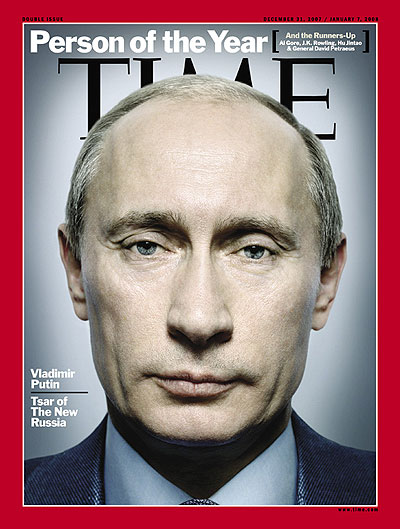 Vladimir Putin has been in and out of Russia’s
presidential office since 2000. His most recent reelection
being in 2012. The eccentric, athletic and controversial
leader has found his way in the spotlight for many
contentious issues.
Vladimir Putin has been in and out of Russia’s
presidential office since 2000. His most recent reelection
being in 2012. The eccentric, athletic and controversial
leader has found his way in the spotlight for many
contentious issues.
He has drawn national attention for passing a law this summer that bans the discussion or development of “non-traditional” relationships – targeting homosexuals, causing him to jail the “Pussy Riot” protestors. The repression in Chenchnya also occurred under Putin’s term in office as well as the murders of journalist Anna Politkovskaya and former spy Alexander Litivenko. More recently, he has come into the global spotlight by marketing himself as someone who found a non-violent solution to the conflict in Syria.
But was he really an agent of peace or an opportunist who saw a gap and leveraged it for his advantage? In studying Putin’s leadership style, camps are divided. Is he a tyrannical devil or a real time godsend?
While Putin exhibits some characteristics of a participative leader because Russia is classified as a democracy, Putin still controls much of the government as leader of the country’s largest political party, United Russia. Putin is also an authoritative leader in some ways, for instance, his pronouncements on homosexuality and the repression in Chenchnya. In response to Putin’s NY Times Op Ed, John McCain recently wrote an article accusing Putin of empowering a few wealthy Russians, perpetuating social inequity, and suppressing freedom of the press.
But Putin also displays characteristics of charismatic leadership. He has strong communication skills and he has convinced many of Russia’s citizens to believe in him and his vision for the country. Because of this he enjoys a 60 percent approval rating. He has also positioned himself as a levelheaded global leader saving Syria from war, by capitalizing on an off-the-cuff statement by Secretary John Kerry, and offering a “solution” of allowing Syria to surrender any chemical weapons to international authorities for destruction. In so doing, he cast himself in the spotlight as a world leader and promoter of peace.
This move was highly strategic and gives insight into the kind of leader Putin is – very strategic and charismatic. A chameleon, changing to suit his environment, with self-preservation as his primary goal.
Here are some sound bytes from Putin himself and others. What kind of leader do you think Putin is?
Putin: “Nobody and nothing will stop Russia on the road to strengthening democracy and ensuring human rights and freedoms.”
McCain: “Putin is systematically disrespecting the Russian people and abusing Russia’s wealth and power to enrich a small group of wealthy associates to the detriment of the rest of the country…Putin doesn’t believe in the values of freedom of speech, freedom of the press, the rule of law, political openness, and social equality.”
George W. Bush: “I looked the man in the eye. I found him to be very straightforward and trustworthy and we had a very good dialogue. I was able to get a sense of his soul. He’s a man deeply committed to his country and the best interests of his country and I appreciate very much the frank dialogue and that’s the beginning of a very constructive relationship.”
Obama: “I don’t think that Mr. Putin has the same values that we do.”

Interesting piece on controversial leader. I’m sure we could discuss it further on, especially in regards to his influence for certain issues in Europe. Good choice!